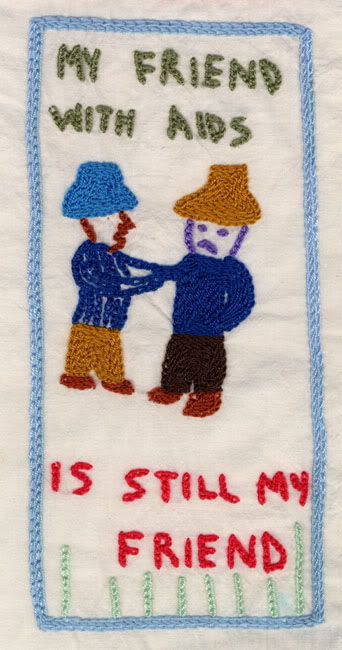HIV/AIDS Where Are The Activists?
 Image from the Communities Uniting to Confront HIV/AIDS in Africa website at the Melville J. Herskovits Library of African Studies at Northwestern University. This is a tapestry made in South Africa to support not abandon those suffering with AIDS.
Image from the Communities Uniting to Confront HIV/AIDS in Africa website at the Melville J. Herskovits Library of African Studies at Northwestern University. This is a tapestry made in South Africa to support not abandon those suffering with AIDS.
As someone who volunteered for both AIDS Project L.A. and the San Francisco AIDS Foundation and was active in a few AIDS Walks, this topic is huge to me. I read an article on HIV/AIDS in the L.A. Weekly when I was young and that alerted me to how much just getting involved and grass-roots activity would help mitigate the impact of this disease. That was a long time ago and I would say that, for the most part, it worked.
As a result, AIDS isn’t at the forefront of our minds the way it used to be. Unfortunately, another reason why we don’t see much of it in the media is because AIDS has shifted to become more of an inner city, ethnic and Third World issue than one that will not touch the lives of people with education and high incomes as well as those in more developed countries. However, when AIDS first came on the scene it touched everyone. Therefore, everyone was talking about it.
It still can touch everyone, but today it’s mostly the poor. As a result in America it’s black Americans and women who are suffering the most and who gives a shit about them, right?
So it was great to read: At AIDS Conference, More Efforts Urged to Empower Women. At the XVI AIDS Conference in Toronto that is happening until August 18th both Bill and Melinda Gates attended. Bill Gates said that "stopping AIDS" is the top priority of the Bill and Melinda Gates Foundation. They have also put a priority on empowering women. To quote Gates again “A woman should never need her partner's permission to save her own life."
It’s also great that former President Bill Clinton is on board and active at this conference. He is talking about HIV and AIDS and is trying to reduce the stigma that people associate with HIV/AIDS so that more get tested and, most importantly, get the results of those tests. If you don’t know you have it, you can’t take steps to ensure your own health and to ensure that you won’t spread it to others.
What has to happen now is, at least, within the black American community we have to realize that ignoring it will only make it worse. Although blacks are just over 12% of the population 50% of new HIV infections are black, it's rare that I see HIV and AIDS mentioned in the black media these days. However, being forced to mention it and deal with it is the exact reality that everyone dealt with when this disease first emerged. I guess, it was and is still easy for us, as a group, to say it is a gay disease and ignore that we are being impacted disproportionately. It's time we shift this from an arm's length "ain't that a shame" discussion to a mainstream discussion we can have without the stigma because that stigma is taking lives.
Even here in Korea they’ve acknowledged HIV and AIDS and have launched campaigns to encourage their youngster to engage in protected sex. If they can do it here in a society were sexual activity is still seen from a “don’t ask, don’t tell” perspective, then we in the black community can stop the judgment in our own community and start talking openly and honestly about it. That’s the first step which a lot of us still must take to stop this before it’s too late.
A 50% infection rate in 12% of your population screams a problem that must be solved.












No comments:
Post a Comment
Hey there! Thanks for visiting my blog. It's my first blog, and I'm glad folks are still stopping by even though I'm no longer living in South Korea. Feel free to comment. If you want a personal answer, leave your email, and I won't publish the comment. Nasty comments and spam links will not be tolerated.